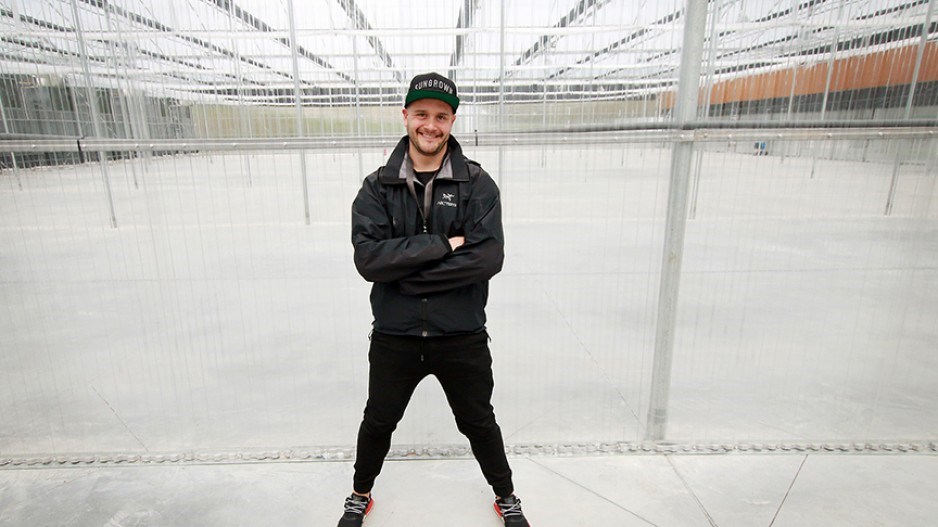With new federal marijuana legislation unveiled and recreational cannabis use in sight, the battle for legalized-market pre-eminence has begun.
And as marijuana production moves out of the shadowed corners of clandestine warehouse operation, new technologies are taking the business literally into the sunlight, making cultivation cleaner, greener and more sustainable.
Among the leaders in the sector is B.C.-based Tantalus Labs Ltd., a medical cannabis producer that cultivates sun-grown cannabis in specialized greenhouses.
Founded in 2012, the company has focused on reimagining cannabis growing methods and bringing marijuana production out of the era of bunkers and basements.
“We set out to build a cultivation methodology that was going to allow us to best optimize the environmental conditions for the cannabis plant,” said Tantalus Labs founder Dan Sutton. “There are a variety of different environmental parameters that affect plant health and at the core of it is light, water and nutrients.”
The Tantalus Sunlab facility in Maple Ridge is Canada’s first environmentally controlled greenhouse engineered specifically for cannabis. The lab is fed entirely by rainwater and uses a fraction of the electricity consumed by traditional indoor cannabis cultivation.
In its recently released Into the Light report, Tantalus claims that indoor cannabis cultivation uses close to 2% of Canada’s electricity. Converting cultivation to greenhouse agriculture could cut energy consumption nearly 90%, the company says.
More greenhouses are popping up as the stigma associated with cannabis production dissipates and growing operations become more visible.
The benefits of the greenhouse cultivation method are nothing new in Eastern Canada.
Ontario-based Aphria Inc. (TSX:APH) has been operating for years out of vegetable greenhouses transformed for cannabis production. Despite perceptions that the Canadian climate might not be suitiable for production, Gary Leong, Aphria’s chief scientific officer, says otherwise.
“We are in Leamington, Ontario; I would say that’s even a better area for growing because if you look on the map where Leamington is, it’s as far south as you can get in Canada,” Leong said. “We get all the temperate weather that you get in B.C., and it’s warmer here in the summer and there is far more sunlight in the summer here.”
Despite B.C.’s widespread reputation for cannabis production and favourable working climate, Ontario has 90% of Canada’s legal cannabis producers.
According to the Tantalus report, only nine of Canada’s 41 licensed producers of medical marijuana are based in British Columbia.
“Using Aphria as the example of the highest cannabis producer in greenhouses in Canada, their costs of production are fivefold lower than in growth rooms,” said Zamir Punja, professor of biotechnology and plant pathology at Simon Fraser University.
The Tantalus report estimates that 15,000 jobs could be created in one year if B.C. produced 40% of domestic cannabis in the new legal market.
Canada has 23 million square metres of industrial greenhouse space, a third of which is in B.C.
Sutton acknowledged that greenhouses, despite some exemptions, pay carbon taxes – yet taxation isn’t likely to scare marijuana growers.
“There is huge opportunity in cannabis. I believe there will be multiple multibillion-dollar firms in this market in the next 10 years, and we need to share the wealth with a generation of bright minds and keen insight.”
Sutton added that the industry is about to shift into overdrive.
“The legal regulated medical production of cannabis in Canada is only about 30 tonnes [annually], so if we are looking to displace the black market with regulated production, we need a 20-to-30-fold increase in our production footprint, and that could mean hundreds if not thousands of new firms coming into the regulated production space.”
Tantalus estimates that B.C.’s marijuana black market is worth $2.7 billion.
Next year will present significant opportunities as companies fight for position in the newly legal market, Sutton said.
He added that his company has its sights set on keeping on top of fast growth over the next 18 to 24 months while maintaining high product quality.
“In 10 years’ time, cannabis users, whether they be recreational or medicinal, are going to expect the same qualifications [of their product] which is the absence of pesticides, the absence of mould and mildew and a degree of consistency.”




